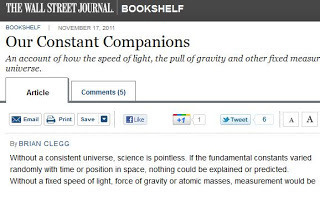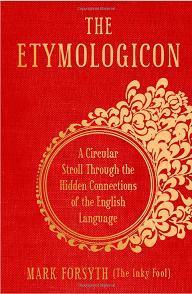Brian Clegg's Blog, page 153
November 29, 2011
It's toys time of year
 I confess I asked for a review copy of this book because it's hard not to get nostalgic about toys as Christmas approaches - waves of James May style nostalgia wash over you. I realized they were onto something good here when I opened the book to flick through it and found I'd read about 25 percent of it before I could force myself to stop. It's just good fun.
I confess I asked for a review copy of this book because it's hard not to get nostalgic about toys as Christmas approaches - waves of James May style nostalgia wash over you. I realized they were onto something good here when I opened the book to flick through it and found I'd read about 25 percent of it before I could force myself to stop. It's just good fun.My suspicions are that the reason a book like this is so attractive is that when we were young (well, at least when I was young) and there were no personal electronic goods to tempt us, toys were the prime objects of our desire. We genuinely used to look into toyshop windows and lust after these things. We used to wait with eager anticipation to see if Father Christmas (none of this 'Santa' rubbish) had delivered on the day. We hadn't been bombarded by give-aways in McDonald's Happy Meals - toys were exciting.
Inevitably there are one or two favourites missing. Matchbox and Corgi cars were present, for instance, but not Dinky. And the text, while providing a lot of interesting historical factoids, was occasionally too rose-tinted. The Spirograph entry, for example, didn't mention that hardly anyone has ever made a Spirograph picture without slipping and spoiling it. Yet this collection of double page spreads, with big colour photos and genuinely interesting content was pleasurable and page-turn-demanding.
Really this ought to be the ideal gift - many, many adults over the age of 30 will appreciate it (though plenty of the toys shown are still going, or were until recently, so the appeal may be even wider). The only trouble is that some people may wonder what you are saying about them if you give them a book about toys. (Especially if it's a bloke and they're getting a book with a picture of Barbie on the firont.) So it may be that this is a gift that, on the whole, you will have to buy for yourself. But if you fancy an escape from the Christmas pressures into a time when things were less complicated, I can highly recommend it. Take a look at Amazon.co.uk and Amazon.com
Published on November 29, 2011 09:08
November 28, 2011
Wonderful magazine, great taste
There is no doubt that for those interested in popular science in the UK, that the premier magazine to buy is New Scientist. I can say this with firmness as they've just published their collection of 'popular science worth giving this Christmas':

I draw your attention particularly to the penultimate book on the 'shelf. Of this we read:


I draw your attention particularly to the penultimate book on the 'shelf. Of this we read:
Inflight Science: Brian Clegg, Icon Books - Everything you ever wanted to know about the science of flying - from the terrible taste of tepid in-flight tea to how we manage to defy gravity in a pressurised aluminium cylinder.What can I say? Excellent taste guys. (And some of the other choices are pretty good too.)
Published on November 28, 2011 08:47
November 25, 2011
What is it with zombies?
 If I'm honest I'm not a great fan of zombie movies (I even found Sean of the Dead a little hard going). Partly it is because I find gore-based horror sickening and in no sense entertaining. (I have to look away in bits of Casuality.) For me a great horror film is one that can scare you without showing you anything gross. And then there's the usual problem with zombie movies of the slow moving predator that somehow the prey can never manage to run away from.
If I'm honest I'm not a great fan of zombie movies (I even found Sean of the Dead a little hard going). Partly it is because I find gore-based horror sickening and in no sense entertaining. (I have to look away in bits of Casuality.) For me a great horror film is one that can scare you without showing you anything gross. And then there's the usual problem with zombie movies of the slow moving predator that somehow the prey can never manage to run away from.However, I can't deny the popularity of zombies, whether they're turning up in civil defence planning, variants of Jane Austen or in the government.
So I was very interested when 'Dr Austin' provided me a copy of his Zombie Science 1Z. This is rather a neat idea - Austin Low (the real name of Dr Austin) is a Scottish performer who specializes in comedy, working with children and science. He performs a spoof lecture on 'zombieology' and this is the book of the lecture. The idea is to take the idea of zombies seriously, try to explain them, getting in quite a lot of medical science (he suggests it's a prion-based infection) and to entertain as well.
The original version of the book was, frankly, rather poorly produced - in fact, I thought it was self-published - but it has now been significantly tidied up and though I find the content occasionally a little whimsical, it's an excellent way to get a young(ish) zombie fan interested in a bit of science. Take a look at Amazon.co.uk and Amazon.com (Kindle fans can find it here for the UK and here for the US).
Published on November 25, 2011 08:48
November 24, 2011
What were they thinking?
There's a lot to love about the new TV advert for the UK's electrical/electronic retailers of last resort PC World and Curry's.
The pastiche of Star Wars is rather well done. The landing craft is believable and there's some nice acting like the almost-entirely-suppressed wince when the manager's car is crushed. Darth Vader is pretty good too.
However, have they really thought through the picture this ad puts across? Here are the key messages I pick up:
Our shops are run by an evil empire - buy things here and you are funding evilOur training involves fear and perilOur attitude to customer service takes its lead from Darth Vader, a (fictional) mass murderer and war criminalOur staff are massed mindless automata of a controlling stateWe are the bad guys All in all, is this really the image that they want? Back to the drawing board, I think.
The version shown is the 'Director's Cut' which is slightly longer than the advert as broadcast
The pastiche of Star Wars is rather well done. The landing craft is believable and there's some nice acting like the almost-entirely-suppressed wince when the manager's car is crushed. Darth Vader is pretty good too.
However, have they really thought through the picture this ad puts across? Here are the key messages I pick up:
Our shops are run by an evil empire - buy things here and you are funding evilOur training involves fear and perilOur attitude to customer service takes its lead from Darth Vader, a (fictional) mass murderer and war criminalOur staff are massed mindless automata of a controlling stateWe are the bad guys All in all, is this really the image that they want? Back to the drawing board, I think.
The version shown is the 'Director's Cut' which is slightly longer than the advert as broadcast
Published on November 24, 2011 08:21
November 23, 2011
Have a word with your authors, please, publishers
 A review by some blokeI know a bit about reviews. The first paid writing I ever did was a review for PC User magazine of a brand new shiny piece of software called Excel. I quite liked it. There followed a number of years writing reviews of business software, then computer games (which really is money for old rope) and finally books.
A review by some blokeI know a bit about reviews. The first paid writing I ever did was a review for PC User magazine of a brand new shiny piece of software called Excel. I quite liked it. There followed a number of years writing reviews of business software, then computer games (which really is money for old rope) and finally books.These days, apart from reviewing for www.popularscience.co.uk and for my blog, I do a fair number of book reviews for print publications from Wall Street Journal to Nature. And I have noticed a worrying trend. Probably because of the increase of easy communication through websites and social networking, people rather expect to be able to get in touch with a reviewer after reading their review. And a rapidly increasing number of authors are dropping me an email.
I put these emails on a scale, from 'appreciated' to 'not a good move', and sadly there are rather too many down the bottom end. Here's how they look:
Appreciated - a nice little note saying thank-you for the review. What's not to love, though the only downside is than when I see an email from an author titled 'Your review' I do get a few moments disquiet before I see it's a nice one.Okay if justified - some emails correct an error in a review. This is fine with an online review as the correction can be published, though there's not a lot of point with a print review. However, make sure it is a genuine error. I recently had one complaining because I'd said the author used a technical term without saying what it meant. He asked me to correct the review, as he had explained the term in a note at the back of the book. Sorry, hardly anyone reads notes - the book was still difficult to understand as there was no explanation in context. I did correct the review, but I can't say I was impressed.Silly - complaining about an opinion. A lot of the content in a review is inevitably an opinion. I recently received one as an editor (someone else wrote the review) starting 'I'm really sorry you thought this, and I am surprised at your conventionalism.' Frankly, so what? Why should I take any notice of your opinion of an opinion? All you are going to do is irritate me, and I may be responsible for another review of one of your books in the future. What's the point?Not a good move - ad hominem attack. Some authors can't resist starting to make nasty remarks and name calling if they don't like a review I wrote. I'm sorry, I can't like every book. I didn't like yours. This is really self-defeating. Not only will this somewhat discourage me from saying nice things about you, if the insults are bad enough I will inform your publisher that you are a loose cannon and they won't be particularly happy. This isn't good for your career.So, my recommendation: by default stick with a dignified silence. If you've got another review that's good, read that instead. If not, wonder why not. I really would only get in touch with a simple thank-you or to correct a specific factual error in an online review (e.g. if it says your book doesn't have an index, and it does). Anything else may make you feel good for a few seconds but isn't going to help and might make things worse.
Published on November 23, 2011 08:12
November 22, 2011
Back to the apocalype
I've been revisiting post-apocalyptic Britain. (Any poor camera work was an attempt at Blair Witch style immediacy. It says here.)
There's something about the cold, heartless autumnal sun that makes it particularly appropriate for one man and his dog to feel like the last survivors in a post-apocalyptic world.
It's all very sci fi. But Goldie doesn't care. There might be rabbits still.
There's something about the cold, heartless autumnal sun that makes it particularly appropriate for one man and his dog to feel like the last survivors in a post-apocalyptic world.
It's all very sci fi. But Goldie doesn't care. There might be rabbits still.
Published on November 22, 2011 08:26
November 21, 2011
Oi, copper nob!
 I'm the one on the rightI'm inspired to write this by a point made in a discussion about the Sepp Blatter/racism in football argument on our local radio station. The host, Mark O'Donnell, recalled a diversity meeting where he asked if it was any different to be insulting to someone because they're black and because they have red hair. He didn't say what the answer was, but I think it is a genuinely important question.
I'm the one on the rightI'm inspired to write this by a point made in a discussion about the Sepp Blatter/racism in football argument on our local radio station. The host, Mark O'Donnell, recalled a diversity meeting where he asked if it was any different to be insulting to someone because they're black and because they have red hair. He didn't say what the answer was, but I think it is a genuinely important question.I admit, I'm biassed. You might not believe it now, but when I was younger I had very red hair. (And, as you can see, curly.) And I did get regular abuse because of it. Lots of name calling and nasty little remarks and even stone throwing once.
I honestly can't see why there is any difference between racial abuse and this. (In fact, technically it is racial abuse, as red hair is a Celtic racial characteristic.)
In saying this, I am not in any sense suggesting that racial abuse is okay because somehow it's 'just banter.' It is inacceptable. But I also think that it equally inacceptable to make fun of people for being ginger or red haired. It's time we stopped shrugging it off as okay because 'It's just a bit of harmless banter.' It's not okay.
When this was discussed on the radio someone phoned in to say that he worked in a bar and someone had refused to be served by 'a ginger.' This isn't just a bit of fun. It's no more or less harmless than racial insults and ought to be given exactly the same treatment. Any other attitude shows that the fight against racism is not about equality but about political correctness.
Published on November 21, 2011 07:49
November 18, 2011
Why did the lemming cross the road?
 Aww, cute. Apparently it's stuffed.You might be surprised that some of the most entertaining press releases I get come from the Institute of Physics. I love them dearly, but just hearing the name 'Institute of Physics' you might think they're a bit po-faced. The reality is quite different, as reflected in the latest release, a doozy entitled Could lemmings be involved in regulating our climate?
Aww, cute. Apparently it's stuffed.You might be surprised that some of the most entertaining press releases I get come from the Institute of Physics. I love them dearly, but just hearing the name 'Institute of Physics' you might think they're a bit po-faced. The reality is quite different, as reflected in the latest release, a doozy entitled Could lemmings be involved in regulating our climate?According to a paper published in the IoP's Environmental Research Letters, the greening of the Arctic may not be down to global warming alone. Although lemmings eat grass and sedge, when they are present in an area these plants actually increase their hold. There are a number of suggestions why, but the important point is that a sudden burst of extra green cover isn't necessarily a sign of climate change if there are lemmings present.
I think this is quite fun, though they could have done better. The opening paragraph of the press release says:
The mention of lemmings usually evokes images of small rodents throwing themselves off the top of cliffs in acts of mass suicide; however, their reputations might no longer be determined by hearsay as a new report suggests they could be having an intricate effect on the Earth's climate.There's a missed opportunity to point out that the throwing themselves off cliffs bit is generally considered to be an invention of a Walt Disney nature film where they were encouraged to do so to dramatic effect, rather than 'hearsay.'
You may be concerned that the story isn't about lemmings regulating the climate (I just love the idea of a horde of lemmings in a vast control room, pulling levers to control the Earth's climate) in some Gaia-like fashion. Rather it appears to be saying that a potential flag for climate change may be being corrupted by lemmings - but there is a section a bit later on that points out that if they increase the greenery they may be changing that area's ability to be a carbon sink, hence influencing climate change, though it's a bit tenuous.
Even so, I think we should pat the IoP on the back for the way lemmings have successfully drawn attention to what otherwise could have been a rather dull story.
P.S. Anyone else remember the computer game Lemmings? I loved it!
Photograph from Wikipedia
Published on November 18, 2011 10:38
November 17, 2011
When does marketing become lying?
 Faced with the question 'When does marketing become lying?' many of those who are suspicious of capitalism and business are likely to come up with the knee jerk response 'Is there a difference?' But that's not fair. Marketing is a perfectly legitimate and sensible activity. You would have to be stupid not to want potential customers to see your product or service in the best light - and as soon as you aspire to this, you are thinking of marketing.
Faced with the question 'When does marketing become lying?' many of those who are suspicious of capitalism and business are likely to come up with the knee jerk response 'Is there a difference?' But that's not fair. Marketing is a perfectly legitimate and sensible activity. You would have to be stupid not to want potential customers to see your product or service in the best light - and as soon as you aspire to this, you are thinking of marketing.Unfortunately sometimes marketing crosses the line into deception. I posted quite a while ago about a marketing campaign where apparently hand-written post-it notes were attached to fake newspapers describing a trainer's work. I've also complained to advertising standards a couple of times about advertising that I think crosses the line. In both cases they didn't agree. One involved paper junk mail for a charity where the envelope implied it contained important personal information and it didn't.
The other was an email that had a subject line that said you had won a prize - in the body of the email it turned out that you hadn't won, you just had an opportunity to enter a competition to win said prize. Now I think that's deception. I wouldn't have read the email if it hadn't been for that lying subject line, and that wasted my time. But advertising standards didn't back me up. Sigh.
I've just had some spam that really pushes the boundary on fibbing, though. It starts out like this:
Hi BrianIt goes on to try to get me to go along to some kind of (apparently free) event including lunch. Now I have never met this person and have certainly not given them my card. This is made doubly clear because I received the mail twice to two different email addresses, one of which isn't on my card. What I don't understand is why the people sending this out think it will encourage me to think positively of someone who is fibbing about knowing me. Sorry, guys, it's a turn off. When marketing crosses the line it ceases to have a positive value. And that's a lesson every business needs to learn.
I had so many business cards in my drawer that
I have put them all in a Rolodex efficiently.
It may have been a while since we met,
sorry I haven't been in touch sooner.
However, I would like to get you lunch if I may please,
it would be a great opportunity to meet again after
such a long time.
Published on November 17, 2011 08:55
November 16, 2011
Ety-what-Icon?
 I sometimes get sent to read a book that doesn't fit with www.popularscience.co.uk but that I want to tell the world about. Such a book is The Etymologicon.
I sometimes get sent to read a book that doesn't fit with www.popularscience.co.uk but that I want to tell the world about. Such a book is The Etymologicon. I ought to get a disclaimer out of the way - this title is published by Icon, the same people who publish my Inflight Science , but don't worry, I've slagged off their books in the past.
As the name sort of suggests, this is a book about where words come from, which as a writer I'm a sucker for - but anyone should find it fun. It's light, entertaining and fascinating. Did you know for instance that 'pool' as in pooling resources and playing pool has nothing to do with water and everything to do with chickens (poulets en France).This is really one of those books where you have to fight hard to resist telling anyone in earshot little snippets every five minutes.
Any moans? Just occasionally I lost interest a tad, but it quickly picked up again and the flowing structure of little chapters meant that it's easy to just read one more. And one more. And another. Someone I spoke to who had already read it made a big thing of the way the end of each mini-chapter leads into the next one (ending up pointing back to the first chapter, hence the 'circular stroll' in the subtitle). I actually found this the least endearing part of the book - I found these links forced and unnecessary. But it just shows, you can't please all the people all the time.
In its rather handsome small hardback form (no dustcover, though) it's clearly intended as a gift book - and is going to make a great one - but this is also a book I would consider unashamedly buying for yourself. If you like words, it's for you.
You can see more about the book at Amazon.co.uk or Amazon.com... and for Kindle readers here in the UK and here in the US.
Published on November 16, 2011 08:22



